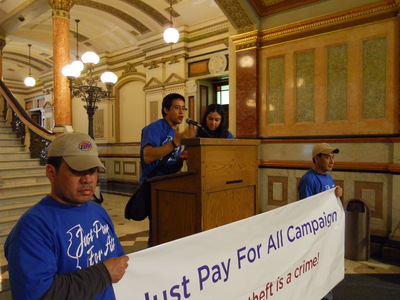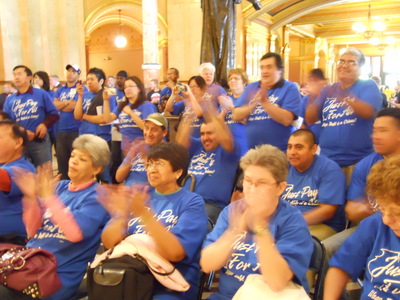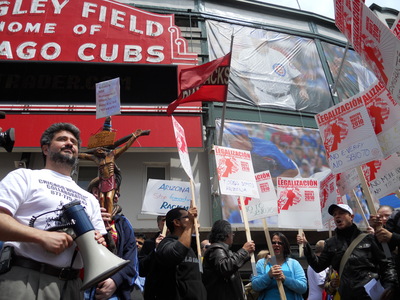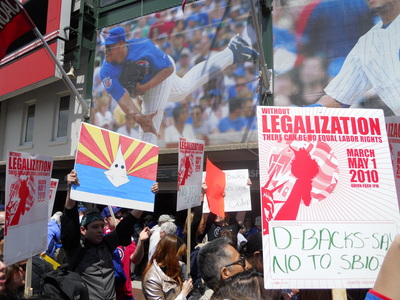This article was originally posted on Gapers Block. Factual corrections were made, in the original article, Jericho Products was named, when it should have read Duraco Products.
This feature is supported in part by a Community News Matters
grant from The Chicago Community Trust and the John S. and James L.
Knight Foundation.
___________________________________________________________________________________

Victor Hernendez addresses a rally in the state capital in Springfield. Hernendez was a victim of wage theft.
You work assuming you'll be paid, but too often, workers are simply
denied what they're owed. It happened to Kim Kambra who worked at Duraco Products in Springwood. "They didn't pay me. I worked over 55
hours a week and they paid me for one week out of the last 10 weeks. My
house went into foreclosure and I lost the legal rights to my house
even though I still live there."
Kambra was one of many Duraco employees who were not paid. Computer
programmer Bill Van Dusen worked for 12 years at Duraco but for three
months in 2008 and another three months in 2009, Dusen was not paid. "I
had to use the money we saved for our kids' education to pay our
bills."
Jericho went beyond not paying their employees. The company "stole
our deductions for health insurance and child support. They collected
that but didn't pay it to the proper person they needed to pay it to,"
according to Van Dusen.
However, Duraco's owners have been paid handsomely. Kevin Lynch,
one of the owners of Duraco Products would have wild venison for his
dogs and chrome parts for his car delivered to the company while three
employees' homes went into foreclosure.
Duraco isn't the only company in the Chicago area cheating its
employees. Victor Hernendez worked at Park Management in Chicago but is
owed 21 thousand dollars from the company. He filed a complaint with
the Illinois Department of Labor in 2008, and while the IDOL has agreed
with his complaint, Park Management still has not paid him.
Liz Rush, an employee at Renzenburger Warehouses, became active with the
Warehouse Workers for Justice
after she was forced to work overtime without being paid. "'It's your
job. It's your job. You'll get written up,' [managers] say, so we do
things with no pay just so we can keep our jobs."
Its not just a few corporations getting away with such behavior. Adam Kader from
ARISE Chicago's Worker Center explained, "We see non-compliance [with labor law] as the standard," in low wage jobs.
The study
"Unregulated Work in Chicago" produced by the Center for Urban Economic
Development at the University of Illinois at Chicago, estimates that
"in a given week, approximately 146,300 workers in Chicago and suburban
Cook County have at least one pay-based violation. Extrapolating from
this figure, front line workers in low wage industries lose more than
$7.3 million per week as a result of employment and labor law
violation."
"We're not just talking about the underground economy or a few rogue
employers," Professor Nik Theodore, who helped write the report, said.
"We're talking about some of the largest, fastest growing industries in
the Chicago area. Key clusters such as retail, restaurants and grocery
store. Caregivers like home healthcare workers and domestic workers.
Residential construction, warehouses, segments of the manufacturing
sector. Personal services like laundries and beauty salons and building
services like janitors and security guards."
The study used respondent driven sampling, a survey method where
workers referred other workers, allowing the study to establish trust
better that other surveys. This method allowed the survey to reach low
income front line workers in many different industries, an estimate 310
thousand such workers in Cook County.
Twenty-six percent of workers in the sample were paid less than the
legally required minimum wage in the previous work week. Of those who
worked more than 40 hours during the previous week 67 percent were not
paid the legally required overtime rate.
Many workers faced meal break violations as well. Three quarters of
the sample worked enough for a break but 43 percent received no break,
had breaks shortened due to employer interruption, or had their break
interrupted in other ways.
Of the tipped workers in the study, 15 percent were not paid the tipped worker minimum wage.
Twenty-six percent of the workers in the study made a complaint or
attempted to form a union. Of those 35 percent experienced one or more
forms of illegal retaliation from their employer or supervisor. Fired,
suspended, threatened to call immigration, or cut hours or pay.
This crime spree in wage theft has a real impact on the economy in
Illinois.
Theodore explained that it is "bad economics to think we can
rebuild the economy on the back of illegal workplace practices." Citing
a race to the bottom between companies that have to compete against
corporations that don't pay their employees, leading to wages being
depressed across whole industries.
Government Regulators have Limited Resources to Enforce Laws
The
Illinois Department of Labor
is one of the smaller agencies in Illinois. With only 87 employees,
the IDOL must respond to 8,000 to 9,000 complaints a year regarding
wages.
Bert Rodriguez, Assistant Director of the IDOL, explained that they
"try to resolve the issue at our level. Trying to mediate the issue and
hopefully get the worker the back wages due or address whatever
workplace violation uncovered. In a lot of cases we are unsuccessful in
those efforts. In a lot of cases we find uncooperative employers."
The IDOL will, "partner with the office of the attorney general... once
we make a determination," if the case is worth it.
The Illinois Department of Labor often does not have the resources or
authority to pursue the cases it is presented with. Which is why a
coalition of community groups called the
Just Pay for All Campaign
is pushing for a bill that would strengthen the IDOL's ability to seek
lost wages and punish employers that steal wages. It would allow the
IDOL to pursue cases without needing to go to the Attorney General's
office, potentially resolving disputes months sooner than it currently
takes.
The bill was sponsored by Illinois Senator William Delgado and passed
in the Illinois Senate unanimously. Representative Elizabeth Hernendez
sponsored the bill in the Illinois General Assembly.
Delgado worked with the Just Pay for All Campaign and the Illinois
Chamber of Commerce to draft a bill that they could agree on. Jay
Shapman from the Illinois Chamber of Commerce "felt that the original
bill went too far, but came up with a version that we believe will go
after the most egregious offenders," Delgado says.
According to Representative Hernendez, "The majority of our business
community are following the rules... unfortunately there are business
people using this as a model, so it's those few we are trying to get."
Katherine Kolon, a lawyer with the
Working Hands Legal Clinic,
described the legislation as bringing Illinois' labor law regime into
line with other labor laws on the state and federal level. The bill
would not raise taxes but would allow the IDOL to fine violators more
quickly, as they would not have to go to the Attorney General's office
in order to seek redress. The bill will be voted on by the General
Assembly in the next few weeks.
Wage theft is coming under increasing scrutiny from the federal
Department of Labor. Hilda Solis, the new Secretary of Labor, calls
herself "the new sheriff in town," implying a renewed effort to crack
down on business that steal from their employees.
On March 31 Solis spoke at UIC to unveil the new
"We Can Help"
campaign aimed at raising awareness among workers about the DOL's wage
and hours divisions. The campaign seeks to let documented and
undocumented workers know about their rights and that they can use the
DOL. Solis has big aspirations for the 2nd largest enforcement agency in
the federal government, "those who break our nations labor laws and
prey on vulnerable workers, it ends today."
The Department of Labor under Solis has been able to increase funding
back to its 2001 levels, before the Bush administration cut funding to
that department. Solis's DOL has hired 250 new wage and hour
investigators but, "hopes to do more."
However even with the larger budget and increased staff, the extent
of the wage theft leaves the DOL to pick and choose which cases it
pursues.
According to Solis, "There is no way in the world we can go
after every single complaint, we don't have enough staff to do it. But
we can target certain segments of our communities where we know there
are abuses going on." Solis wants the DOL to work with non-profits,
labor, faith and community groups, to determine where the most egregious
cases of wage theft are occurring.
According to Theodore, from 1980 to 2007 federal funding for the
Department of Labor's Wage and Hour division declined 31 precent as the
workforce increased by 52 percent. With the current staffing levels it
would take the DOL 133 years to inspect each workplace once.
Even the "We Can Help" campaign might be woefully inadequate to raise
awareness about what workers can do about wage theft. Will a few
videos posted online and radio spots spook employers into paying their
employees and informing workers of their rights?
Leone Bicchieri, the Executive Director of the Chicago Workers
Collaborative explained that it was too early to tell. Bicchieri was
"hopeful, but we'll have to see" whether the program has the desired
impact.
In many ways the Department of Labor is the public option for those
workers who can't afford a lawyer to seek redress for wage theft.

Supporters of the Just Pay for All campaign rally in the Rotunda of the Illinois State Capital in Springfield.
What Needs to Be Done?
Kim Kambra testified to the Illinois General Assembly Labor
Committee, saying, "If I steal a piece of pizza, I'm going to jail...
[Duraco products] have no consequences for not paying us. They owe us
over 25 thousand dollars in wages. It's unfair to all the business that
have to compete with them. It's unfair to us with families that have
to support them and are losing our houses. The Department of Labor
right now has no power to make them pay."
It is a testament to our society that so little is done to stop the
practice of wage theft. What can be done to stem the crime spree?
According to Professor Nik Theodore it is important to keep wage
theft on the agenda of lawmakers and it is imperative to increase
resources to the Department of Labor to handle such cases.
However, workers who have had their wages stolen frequently turn to
community groups to get their just compensation. The Chicago Workers
Collaborative for example often uses workplace actions, legal pressure
and grassroots organizing to get workers their stolen pay back.
According to Leone Bicchieri from the Chicago Workers Collaborative,
"The first line of defense is workers themselves being organized. The
management of a company can literally sense in the workplace when the
workers are united and it changes the dynamic of that workplace."
ARISE Chicago has been able to recover over $3,800,000 in lost wages
for workers who have not been paid. The Latino Union has used direct
actions at employers who don't pay their workers in order to pressure
employers. According to Bicchieri, passing a law is only a step towards
stopping wage theft. Community groups need to be prepared to follow up
on reports of abuse, and hold employers accountable to the standards in
any new law.







